The Nonwoven Weed Control Fabric Market is estimated to be valued at USD 1.8 billion in 2025 and is projected to reach USD 3.4 billion by 2035, registering a compound annual growth rate (CAGR) of 6.3% over the forecast period. Supported by a steady CAGR of 6.3%, this growth is driven by increasing demand in landscaping, agriculture, and horticulture applications. During the first five years (2025–2030), the market is expected to rise from USD 1.8 billion to USD 2.5 billion, adding USD 0.7 billion, which accounts for 43.8% of the total incremental growth, with a 5-year multiplier of 1.39x.
The second phase (2030–2035) contributes USD 0.9 billion, representing 56.2% of incremental growth, signaling strong demand for eco-friendly and durable weed control solutions in both commercial and residential sectors. Annual increments increase from USD 0.1 billion in early years to USD 0.2 billion by 2035, reflecting the growing emphasis on sustainable land management and organic farming practices. Manufacturers focusing on biodegradable, UV-resistant, and cost-efficient fabrics will capture the largest share of this USD 1.6 billion opportunity as green landscaping and agricultural solutions gain popularity.
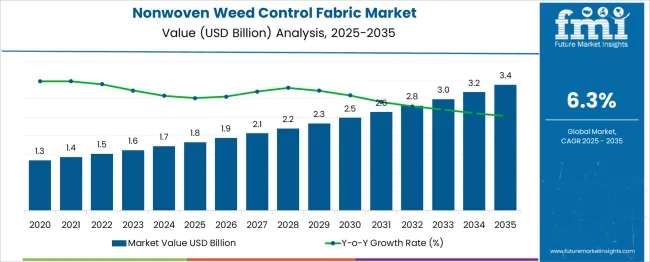
| Metric | Value |
|---|---|
| Nonwoven Weed Control Fabric Market Estimated Value in (2025E) | USD 1.8 billion |
| Nonwoven Weed Control Fabric Market Forecast Value in (2035F) | USD 3.4 billion |
| Forecast CAGR (2025 to 2035) | 6.3% |
The nonwoven weed control fabric market is undergoing notable expansion, driven by increasing adoption of sustainable and efficient agricultural practices, heightened awareness of soil health, and growing demand for cost-effective weed management solutions. Rising focus on reducing chemical herbicide usage and maintaining crop yield has positioned nonwoven fabrics as a preferred alternative among end users.
Continuous advancements in manufacturing technologies and material innovations are enhancing product durability and effectiveness, making them suitable for diverse climatic conditions and applications. Future growth is anticipated to be supported by favorable agricultural policies, rising commercial landscaping activities, and increasing investments in product customization to meet specific regional and crop requirements.
The nonwoven weed control fabric market is segmented by material, application, weight, and geographic regions. By material, the nonwoven weed control fabric market is divided into Polypropylene, Polyethylene, and Polyester Nylon. In terms of application, the nonwoven weed control fabric market is classified into Agriculture, Horticulture, Landscape Design, and Roadside Maintenance.
Based on weight, the nonwoven weed control fabric market is segmented into Midweight, Lightweight, and Heavyweight. Regionally, the nonwoven weed control fabric industry is classified into North America, Latin America, Western Europe, Eastern Europe, Balkan & Baltic Countries, Russia & Belarus, Central Asia, East Asia, South Asia & Pacific, and the Middle East & Africa.
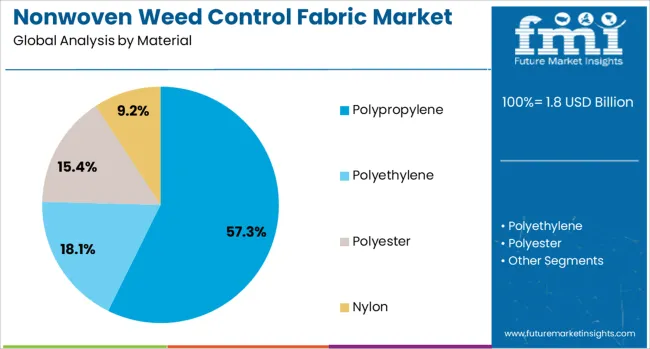
When segmented by material, polypropylene is expected to account for 57.3% of the market revenue in 2025, positioning it as the leading material segment. This leadership is attributed to the inherent strength, durability, and resistance to degradation of polypropylene, which have made it the preferred choice for weed control fabrics.
Its ability to withstand prolonged exposure to sunlight and moisture without significant loss of performance has reinforced its widespread adoption in both agricultural and landscaping applications. The material’s cost efficiency and compatibility with various manufacturing processes have enabled manufacturers to produce lightweight yet robust fabrics that meet diverse customer needs.
Additionally, polypropylene’s recyclability and improved environmental profile compared to other synthetic options have further strengthened its position in the market.
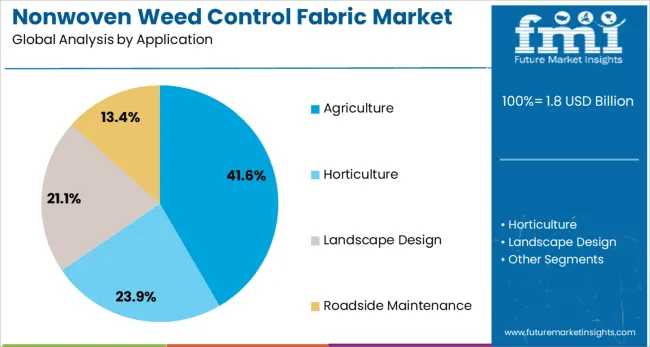
Segmented by application, agriculture is projected to hold 41.6% of the market revenue in 2025, establishing itself as the top application segment. This prominence is being driven by the increasing emphasis on improving crop productivity and minimizing the environmental impact of conventional weed control methods.
Agricultural users are increasingly favoring nonwoven weed control fabrics to reduce dependency on chemical herbicides, enhance soil moisture retention, and maintain optimal soil temperature. The scalability of these fabrics for use in diverse crops and farming systems has supported their strong adoption in large-scale farms as well as in high-value specialty crops.
Moreover, the ability to reduce labor costs and deliver consistent performance across seasons has further encouraged farmers to integrate these fabrics into their cultivation practices, reinforcing the segment’s leadership.
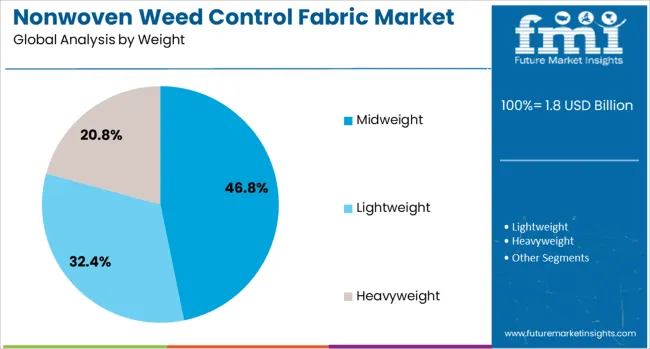
When segmented by weight, midweight fabrics are forecast to capture 46.8% of the market revenue in 2025, emerging as the dominant weight category. This leadership has been supported by their balanced performance characteristics, which offer an optimal combination of durability, ease of handling, and cost effectiveness.
Midweight fabrics have been observed to deliver sufficient strength to resist tearing and degradation while remaining light enough for convenient installation and repositioning. Their versatility across a wide range of crops, terrains, and climatic conditions has contributed to their widespread preference among both agricultural and landscaping professionals.
The ability of midweight fabrics to deliver reliable weed suppression without overburdening users with excessive material cost or complexity has solidified their leading position in the weight segment.
The nonwoven weed control fabric market is expanding due to increasing demand for cost-effective, chemical-free weed management solutions in agriculture, landscaping, and horticulture. Opportunities are growing in biodegradable and multi-functional fabric applications, particularly for environmentally conscious consumers. Emerging trends in sustainable materials are shaping the market, while challenges such as high manufacturing costs and material shortages could hinder growth. By 2025, the market is expected to continue evolving, with innovations in fabric performance and production efficiency ensuring market growth.
The nonwoven weed control fabric market is driven by the increasing need for effective and cost-efficient weed management in agriculture. Nonwoven fabrics offer superior durability and weed suppression, reducing the need for chemical herbicides. With rising agricultural production and a focus on improving crop yields, nonwoven fabrics are becoming a go-to solution for weed control. By 2025, the market will continue to benefit from this growing demand, as more farmers seek eco-friendly alternatives to traditional chemical weed control methods.
The nonwoven weed control fabric market is seeing growing opportunities in landscaping and horticulture applications. These fabrics are gaining traction due to their ability to promote healthy soil while effectively blocking weeds. Landscapers and garden centers are increasingly adopting nonwoven fabrics for garden beds, walkways, and decorative spaces. The growing demand for efficient, low-maintenance solutions in landscaping is expected to drive market growth. By 2025, the market is expected to see expanded adoption in both professional and residential gardening sectors.
Emerging trends in the nonwoven weed control fabric market include the shift toward biodegradable and multi-functional materials. Consumers and businesses are looking for eco-friendly options that provide effective weed control while being biodegradable to reduce environmental impact. Additionally, fabrics with enhanced permeability for water and nutrients are becoming increasingly popular for their benefits to soil health. By 2025, these innovations are expected to dominate the market, as demand for sustainable, high-performance products grows.
Despite the growth potential, the nonwoven weed control fabric market faces challenges related to high manufacturing costs and material shortages. The cost of raw materials, such as polypropylene and polyester, fluctuates, making production expensive. Furthermore, the complex manufacturing process for high-quality weed control fabrics adds to the overall cost. Supply chain disruptions and scarcity of materials could also hinder production, especially in regions with limited access to raw materials. These issues may slow down market growth unless addressed through more efficient manufacturing techniques and reliable sourcing strategies by 2025.
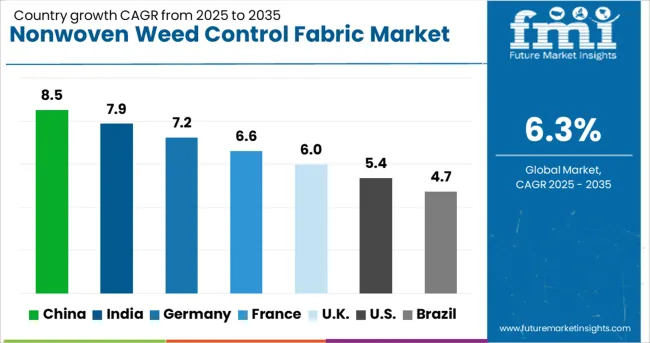
| Country | CAGR |
|---|---|
| China | 8.5% |
| India | 7.9% |
| Germany | 7.2% |
| France | 6.6% |
| UK | 6.0% |
| USA | 5.4% |
| Brazil | 4.7% |
The global nonwoven weed control fabric market is projected to grow at a 6.3% CAGR from 2025 to 2035. China leads with a growth rate of 8.5%, followed by India at 7.9%, and Germany at 7.2%. The United Kingdom records a growth rate of 6.0%, while the United States shows the slowest growth at 5.4%. These differences in growth rates are driven by factors such as increasing adoption of sustainable agricultural practices, growing awareness of environmental impact, and the need for efficient weed management in agriculture. Emerging markets like China and India are witnessing rapid growth due to industrial expansion, rising agricultural production, and increasing demand for cost-effective, eco-friendly solutions. In contrast, more mature markets like the USA and the UK show steady growth, driven by the ongoing demand for effective weed control in established agricultural practices. This report includes insights on 40+ countries; the top markets are shown here for reference.
The nonwoven weed control fabric market in China is experiencing robust growth, with a projected CAGR of 8.5%. As China’s agricultural sector continues to modernize and expand, the demand for efficient, eco-friendly weed control solutions is rising. Nonwoven weed control fabrics, which provide effective protection against weed growth while promoting water retention and soil health, are gaining popularity. Additionally, China’s increasing focus on sustainable farming practices, government support for environmentally friendly agricultural methods, and the growing need for efficient farming technologies further drive market demand. This market is also benefitting from the growing adoption of organic farming and the country’s expanding horticultural industry.
The nonwoven weed control fabric market in India is projected to grow at a CAGR of 7.9%. As India’s agricultural sector continues to evolve, the demand for efficient and cost-effective weed control methods is rising. Nonwoven weed control fabrics, which help farmers reduce the need for chemical herbicides, are becoming a popular choice in organic farming, horticulture, and landscaping. Furthermore, the government’s push for sustainable agriculture, increased awareness about the environmental impact of traditional weed management methods, and growing agricultural production in the country contribute to the market’s growth. The increase in smallholder farmers and their shift toward modern farming solutions also supports the expansion of the nonwoven weed control fabric market.
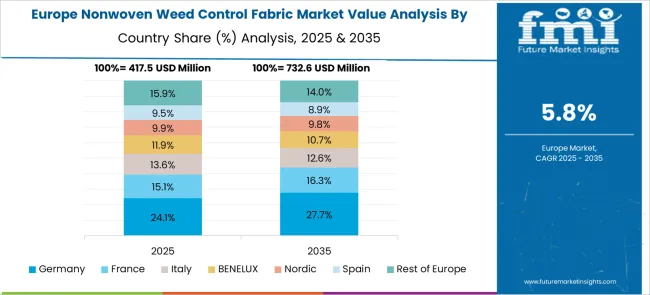
The nonwoven weed control fabric market in Germany is projected to grow at a CAGR of 7.2%. As one of Europe’s leading agricultural nations, Germany is experiencing increased demand for eco-friendly solutions in farming. Nonwoven weed control fabrics, which offer sustainable weed management without chemicals, are gaining popularity in Germany’s agricultural and landscaping sectors. The country’s strong commitment to sustainability and environmentally friendly farming practices, along with increased adoption of organic farming, further contributes to the market’s growth. Additionally, Germany’s advancements in agricultural technologies and machinery help drive the demand for efficient, high-performance weed control solutions.
The nonwoven weed control fabric market in the United Kingdom is projected to grow at a CAGR of 6%. The UK ’s commitment to sustainable agriculture and organic farming practices is driving the demand for nonwoven weed control fabrics. These materials are increasingly used in landscaping, horticulture, and organic farming, as they offer an eco-friendly alternative to traditional herbicide-based weed control methods. The growing emphasis on environmental sustainability and reducing the use of chemicals in farming further supports market expansion. Despite being a mature market, the ongoing demand for eco-friendly solutions in both urban and rural areas continues to drive steady growth.
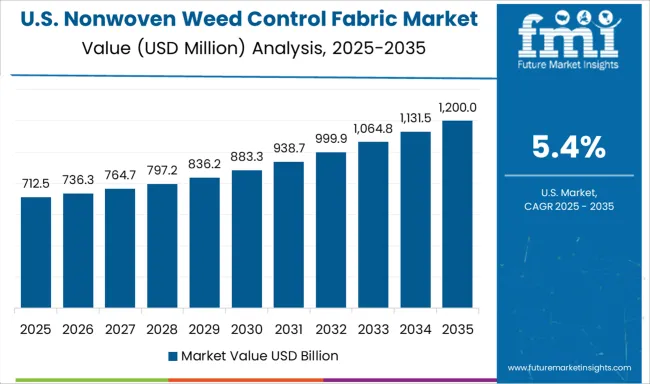
The nonwoven weed control fabric market in the United States is expected to grow at a CAGR of 5.4%. The USA has a well-established agricultural sector, with steady demand for nonwoven weed control fabrics, particularly in organic farming, landscaping, and horticulture. The growing interest in sustainable farming practices, coupled with the increasing use of nonwoven fabrics to manage weeds without chemicals, is contributing to market growth. Additionally, the rise of eco-conscious consumer behavior and increased awareness about environmental protection further support the adoption of nonwoven fabrics. However, growth is slower compared to emerging markets due to the maturity of the USA market.
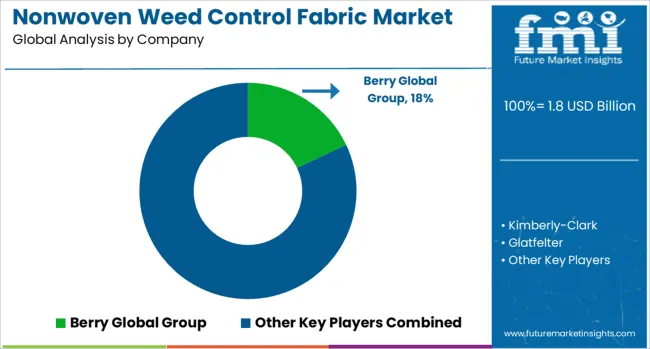
Companies such as Berry Global Group, Kimberly-Clark, DuPont, and Ahlstrom Munksjö focused on advanced fabric technologies, UV resistance, and durability, ensuring long-term weed suppression across commercial and residential applications while building robust distribution and customer networks. Forecast strategies indicate expansion toward eco-friendly, biodegradable, and recyclable fabrics, alongside multi-layer and water-permeable designs that enhance soil health and usability. Differentiation levers include material innovation, breathability, tensile strength, UV stability, and customization for niche applications like organic farming, erosion control, and landscaping. Regional expansion is targeted at emerging markets in Asia, Latin America, and Africa, where growing interest in sustainable agriculture and home gardening creates high adoption potential.
Strategic alliances with agricultural technology firms, partnerships with landscaping and horticulture providers, and investment in local production facilities are expected to strengthen market positioning. Barriers such as manufacturing complexity, raw material availability, and regulatory compliance influence entry and competitive intensity. The matrix highlights that companies combining technological differentiation, regional scalability, and sustainable product offerings will define leadership, offering actionable insights for C-level executives evaluating investment, partnership, or acquisition strategies in the global nonwoven weed control fabric market.
| Item | Value |
|---|---|
| Quantitative Units | USD 1.8 Billion |
| Material | Polypropylene, Polyethylene, Polyester, and Nylon |
| Application | Agriculture, Horticulture, Landscape Design, and Roadside Maintenance |
| Weight | Midweight, Lightweight, and Heavyweight |
| Regions Covered | North America, Europe, Asia-Pacific, Latin America, Middle East & Africa |
| Country Covered | United States, Canada, Germany, France, United Kingdom, China, Japan, India, Brazil, South Africa |
| Key Companies Profiled | Berry Global Group, Kimberly-Clark, Glatfelter, DuPont, Ahlstrom Munksjö, Freudenberg Performance Materials, TWE Group, and Suominen Corporation |
| Additional Attributes | Dollar sales by fabric type and application, demand dynamics across agriculture, landscaping, and construction sectors, regional trends in nonwoven weed control fabric adoption, innovation in UV resistance and biodegradability, impact of regulatory standards on environmental safety, and emerging use cases in sustainable farming and urban landscaping. |
The global nonwoven weed control fabric market is estimated to be valued at USD 1.8 billion in 2025.
The market size for the nonwoven weed control fabric market is projected to reach USD 3.4 billion by 2035.
The nonwoven weed control fabric market is expected to grow at a 6.3% CAGR between 2025 and 2035.
The key product types in nonwoven weed control fabric market are polypropylene, polyethylene, polyester and nylon.
In terms of application, agriculture segment to command 41.6% share in the nonwoven weed control fabric market in 2025.






Our Research Products

The "Full Research Suite" delivers actionable market intel, deep dives on markets or technologies, so clients act faster, cut risk, and unlock growth.

The Leaderboard benchmarks and ranks top vendors, classifying them as Established Leaders, Leading Challengers, or Disruptors & Challengers.

Locates where complements amplify value and substitutes erode it, forecasting net impact by horizon

We deliver granular, decision-grade intel: market sizing, 5-year forecasts, pricing, adoption, usage, revenue, and operational KPIs—plus competitor tracking, regulation, and value chains—across 60 countries broadly.

Spot the shifts before they hit your P&L. We track inflection points, adoption curves, pricing moves, and ecosystem plays to show where demand is heading, why it is changing, and what to do next across high-growth markets and disruptive tech

Real-time reads of user behavior. We track shifting priorities, perceptions of today’s and next-gen services, and provider experience, then pace how fast tech moves from trial to adoption, blending buyer, consumer, and channel inputs with social signals (#WhySwitch, #UX).

Partner with our analyst team to build a custom report designed around your business priorities. From analysing market trends to assessing competitors or crafting bespoke datasets, we tailor insights to your needs.
Supplier Intelligence
Discovery & Profiling
Capacity & Footprint
Performance & Risk
Compliance & Governance
Commercial Readiness
Who Supplies Whom
Scorecards & Shortlists
Playbooks & Docs
Category Intelligence
Definition & Scope
Demand & Use Cases
Cost Drivers
Market Structure
Supply Chain Map
Trade & Policy
Operating Norms
Deliverables
Buyer Intelligence
Account Basics
Spend & Scope
Procurement Model
Vendor Requirements
Terms & Policies
Entry Strategy
Pain Points & Triggers
Outputs
Pricing Analysis
Benchmarks
Trends
Should-Cost
Indexation
Landed Cost
Commercial Terms
Deliverables
Brand Analysis
Positioning & Value Prop
Share & Presence
Customer Evidence
Go-to-Market
Digital & Reputation
Compliance & Trust
KPIs & Gaps
Outputs
Full Research Suite comprises of:
Market outlook & trends analysis
Interviews & case studies
Strategic recommendations
Vendor profiles & capabilities analysis
5-year forecasts
8 regions and 60+ country-level data splits
Market segment data splits
12 months of continuous data updates
DELIVERED AS:
PDF EXCEL ONLINE
Nonwoven Fabrics Market Size and Share Forecast Outlook 2025 to 2035
Nonwoven Polyester Fabric Market Growth – Trends & Forecast 2025 to 2035
Automotive Nonwoven Fabrics Market Size and Share Forecast Outlook 2025 to 2035
Control Network Modules Market Size and Share Forecast Outlook 2025 to 2035
Controllable Shunt Reactor for UHV Market Size and Share Forecast Outlook 2025 to 2035
Fabric Spreading Machine Market Forecast Outlook 2025 to 2035
Fabric Freshener Market Forecast and Outlook 2025 to 2035
Fabric Inspection Machine Market Size and Share Forecast Outlook 2025 to 2035
Fabric Cutting Machine Market Size and Share Forecast Outlook 2025 to 2035
Control Room Solution Market Size and Share Forecast Outlook 2025 to 2035
Control Knobs for Panel Potentiometer Market Size and Share Forecast Outlook 2025 to 2035
Controlled-Release Drug Delivery Technology Market Size and Share Forecast Outlook 2025 to 2035
Fabric Testing Equipment Market Size and Share Forecast Outlook 2025 to 2035
Nonwoven Filter Media Market Size and Share Forecast Outlook 2025 to 2035
Controlled Environment Agriculture (CEA) Market Size and Share Forecast Outlook 2025 to 2035
Fabric Toys Market Size and Share Forecast Outlook 2025 to 2035
Control Cable Market Size and Share Forecast Outlook 2025 to 2035
Nonwoven Furniture Construction Sheeting Market Size and Share Forecast Outlook 2025 to 2035
Nonwoven Packaging Market Size and Share Forecast Outlook 2025 to 2035
Nonwoven Floor Covers Market Size and Share Forecast Outlook 2025 to 2035

Thank you!
You will receive an email from our Business Development Manager. Please be sure to check your SPAM/JUNK folder too.
Chat With
MaRIA